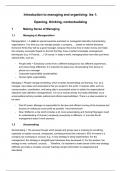Introduction to managing and organising: les 1:
Opening, thinking, contextualizing
1 Making Sense of Managing
1.1 Managing & Managerialism
Managerialism = A claim to special expertise premised on managerial rationality characterizing
organizations .
Someone thinks they will be a good manager, because they know how to make money and make
the company successful based on the fact that they have a certain knowledge (management
techniques) (e.g. in Finance,
rational skills, such as:
- People skills = Everybody comes from a different background, has different experiences,
and views things differently. It is important to adjust your sensemaking from person to
person as a manager
- Corporate responsibility (sustainability)
- Human rights responsibility
Managing = People manage something, which includes sensemaking and framing. You, as a
manager, have ideas and assumptions that you project to the world. It requires skills, such as
communication, coordination, and being able to accomplish action to obtain the organizational
objectives (see definition managerialism). It is not a neutral activity (not really definable), but a
social-political activity (societal, political and ethical responsibilities). There is a clear evolution to
be seen:
- Past 40 years: Manager is responsible for the lean and efficient running of the business and
focuses on making as much profit as possible. Very hierarchical!
- Now: Shifted to a role which includes a lot more sensemaking and framing! Managers need
an understanding of (human) complexity (everybody is different)
1.2 Sensemaking
Sensemaking = The process through which people and groups give a meaning to something,
especially to explain unusual, unexpected, confusing events (the unknown). 80% of events in a
company are confusing or unusual. E.g.: A new strategy is being implemented. For the
management, this strategy is straightforward (because they developed it). For the workers, the
(difficult) and make a complex concept/ roadmap simple (Information is categorized and
described).
, Sensemaking can also be seen as a tool to tackle safety, operations and functional teamwork.
Sensemaking in a capital system: It is important to be critical! Top companies such as Nike and
Apple are very good at making sense (even though they produce in low wage countries, etc.) (=
greenwashing).
1.3 Framing
Framing = A synonym of making sense of a certain situation
something out of nothing. A manager has the responsibility to provide different frames and connect
these frames. A frame defines what is relevant for you as a person, employee, manager.
Framing is done by using metaphors, citing traditions, repeating stories, etc. A framework can
be adjusted (reframing) through this.
2 Managerial Rationality = a critique on managerialism
Managerial rationality = Managers often assume they can manage a company/ group, based on
the fact that they have the hard skills to do so (managerialism). The other aspects are ignored.
However, this is not enough. Other skills are needed, such as symbolic capital (reputation) and
social capital (relations). Managerial rationality is the conclusion that managerialism is not enough
Management is always changing (resistance from within the organization is to be expected).
3 Digital Organizations
The Digital Age:
- Every company uses technology, data and big data. It plays a completely different role in
business. Competition is based more on competitive advantages that arise from innovation
- Labour is more international than ever before (
- The world is becoming increasingly global (companies dividing their production in different
- We are
find a balance
Digitalization = The use of digital technologies and of data (digitized from non-digital sources or
originally created as such) to manage organizational processes. This means organisations will
increase knowledge based work (with more focus on software and data analysis). Organizations
should also have employees who are capable of problem solving rather than having to rely on
higher placed people.
, 3.1 Digital bubbles (networks)
bubbles. These are small networks of like-minded people who
join a network and subscribe to these shared opinions and groups (e.g. Anti-vaxxer groups). These
networks depend more on an emotional connection rather than a rational connection. This
happens mostly on social media and preferred websites. Shared impressions/ narratives are
created through these online networks.
These online networks a -
organizations, this can be a problem. E.g.: A car company promotes a new car online, which is
happily received by car enthusiasts and the car community (digital bubble), but will also be heavily
criticized by environment activists. It creates division.
Social bubbles can also be used to create hype and brand loyalty (e.g. Apple). Companies can
have a big fanbase which will always use their products.
Growing globalization and digitalization also gives companies the opportunity to hire less people
.
3.2 Digital Nomads
Digital Nomads = People with a laptop and an internet connection who can work from wherever
they can. They prefer to be mobile rather than being in a fixed office. People can work from
anywhere in the world.
4 Organizational Culture and Social Relations at Work
There is a great diversity of people in a digital organization (becoming more of an asset for
organizations)
must understand the global differences between the markets they want to trade in.
4.1 Challenges
Work is more transparent and accountable (verantwoordelijk). Anyone can be working at any
Company must employ people that understand the market




